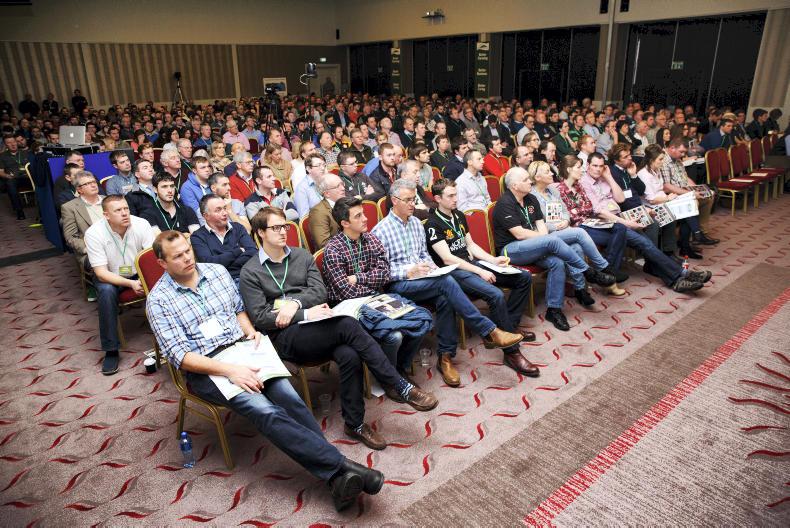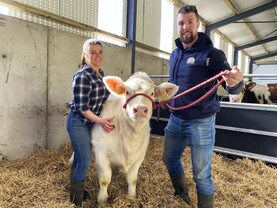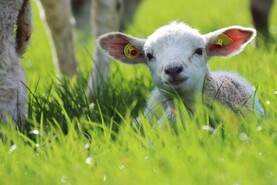Almost 1,000 seats were filled over two days at the 18th Positive Farmers Conference in Cork last week, with a mixture of technical presentations on managing cows and grass, farmers’ views and lots of networking. Aidan Brennan reports on the key messages
Technical messages
Brendan Horan said increasing stocking rate from 2.3 to 2.8 cows/ha requires 20% more feed and he questioned where this was going to come from – growing more grass on the farm or buying in more purchased feed.
When asked about increasing stocking rate on the milking platform by using outfarms as support blocks, he said: “Increasing the stocking rate above what the milking platform can support increases the environmental risk by loading nutrients on to a smaller area. It doesn’t improve farm profit and it makes decision-making way more complicated.”
He said that the two most important decisions farmers should make when planning their system is determining stocking rate and calving date. “Stocking rate should be governed by average grass growth over a number of years (see Table 1). Average means that half the time the farm will be growing less than whatever the average is,” Brendan said.
On calving date, he said the start of calving should be 50 to 60 days before magic day – when grass growth equals grass demand. He said that in the north of the country or on more marginal soils, calving 50 days before magic day is better as it means more grass in the diet.
Teagasc specialist John Maher outlined four areas where farmers can get more out of spring grass. The first is to use the spring rotation planner which has built-in grazing targets, ie 30% grazed in February, 65% grazed by mid-March and start the second round on 5 April.
The next is to monitor regrowth and average farm cover. He said that farmers must do three or four grass measurements in March to see what the average farm cover is and never let it drop below 500kg/ha. He outlined the importance of early nitrogen to grow more grass and gave practical advice for grazing in wet weather.
Michael Murphy presented a paper showing that when combined with crossbreeding, grass and clover swards can increase profit by over 30%.
On breeding, John McNamara and Kevin Ahern spoke about what they have done on the 226-cow Shinagh herd in Bandon to go from a 58% six-week calving rate in 2011 to a 96% six-week calving rate in 2016. The steps can be summarised as follows:
Use Jersey on Holstein Friesian cows and all heifers and use the highest-EBI bulls on the rest.Only use bulls less than 3% calving difficulty on cows and 1.4% on heifers.Cows with BCS 2.75 or less put on once a day milking six weeks before breeding.Cows are tail-painted and watched five times a day.If there are surplus cows, the later-calving ones are sold.
Progressing people
Matthew Jackson and Will Grayling both spoke about their pathway into dairy farming. Both have been profiled in previous editions of the Irish Farmers Journal (24 November 2016, 23 June 2016 and 26 November 2015).
Their backgrounds couldn’t be more different. Matthew grew up in Manchester city centre and went to a school with 3,000 other pupils, while Will was brought up on a 700-cow dairy farm on the North Island of New Zealand.
However, they both forged their own way into the dairy industry. Matthew now owns 400 cows of his own in a share-milking business in north Wales, while Will is an equity partner on a 3,300-cow farm on New Zealand’s South Island where he owns a 30% share of the herd and a 9% share of the 824ha of owned land.
Matthew is 28 and Will is 31, so they are both still young and have the desire and energy to grow their businesses further. Common themes emerged from their success to date. Both are working in collaboration with established farmers. Matthew is working with David Wynne Finch in Wales, while Will is working with Jim van der Poel in Canterbury.
Both started out by buying young stock and building their equity/savings in livestock. They both said that being able to put a tag in a heifer’s ear and call it theirs was a huge morale boost, as it is a tangible proof of ownership and progress.
Quotes
“Treat yourself like a bank, the more valuable you are the more people will want to buy into you, so keep learning new skills and always keep an open mind” – Matthew Jackson.
“When working with someone else, you must be able to see things from their point of view. Successful businesses are win/win for both partners” – Will Grayling.
“Life is too short to stick around for an empty promise, if things aren’t working out cut your ties and move on” – Will Grayling.
“You don’t own the right to any progression, you need to earn it. Put yourself in a position to be identified by being excellent at what you do, showing integrity and being true to your values” – Matthew Jackson.
“Don’t worry about making mistakes, worry about making sure enough preparation is done” – Will Grayling.
“Work for someone that is going to improve your skills, only work for good people” – Will Grayling.
Policy platform
Ornua
In a show of hands, the majority of the audience expressed a desire to have direct ownership of Ornua, as opposed to the current system of farmer ownership through the co-ops, where there is a perceived duplication of costs and a dilution of profits.
Profit monitor
Teagasc was called on by the floor to update the profit monitor for the non-quota era and for everyone to agree on the one model. It was felt that the current system of proportioning costs as a percentage of livestock units in different sectors is not accurate enough and own labour should be included also.
Finance
The whole area of finance for young people without land as collateral came up during Tadhg Buckley’s paper. Currently, chattel mortgages on livestock can only be administered from within a circuit court area, so banks are not giving out chattel mortgages as they lose their security if the animals move to a different circuit court area. A commitment was made that a number of people would come together to review alternative financing arrangements.
Breeding
Michael Murphy from the Positive Farmers appealed to the board of LIC to review its proposal to introduce contracts preventing the sale of progeny from their catalogue to competitors, calling it a “lose-lose scenario for everyone”. There were also further calls for the ICBF to advance the introduction of genomics for Jerseys and to roll out the COW index.
Returns
Laurence Shalloo from Moorepark stressed the importance of looking at return on investment when spending capital: “Just because an investment might be profitable and throw off surplus cash, it might not offer the highest returns. You must factor in your own time and labour too as this has a big bearing on the profitability of some investments.”
Milk solids
It was proposed that the dairy industry move away from referring to prices and costs in terms of cent/litre and refer instead to €/kg milk solid.
Almost 1,000 seats were filled over two days at the 18th Positive Farmers Conference in Cork last week, with a mixture of technical presentations on managing cows and grass, farmers’ views and lots of networking. Aidan Brennan reports on the key messages
Technical messages
Brendan Horan said increasing stocking rate from 2.3 to 2.8 cows/ha requires 20% more feed and he questioned where this was going to come from – growing more grass on the farm or buying in more purchased feed.
When asked about increasing stocking rate on the milking platform by using outfarms as support blocks, he said: “Increasing the stocking rate above what the milking platform can support increases the environmental risk by loading nutrients on to a smaller area. It doesn’t improve farm profit and it makes decision-making way more complicated.”
He said that the two most important decisions farmers should make when planning their system is determining stocking rate and calving date. “Stocking rate should be governed by average grass growth over a number of years (see Table 1). Average means that half the time the farm will be growing less than whatever the average is,” Brendan said.
On calving date, he said the start of calving should be 50 to 60 days before magic day – when grass growth equals grass demand. He said that in the north of the country or on more marginal soils, calving 50 days before magic day is better as it means more grass in the diet.
Teagasc specialist John Maher outlined four areas where farmers can get more out of spring grass. The first is to use the spring rotation planner which has built-in grazing targets, ie 30% grazed in February, 65% grazed by mid-March and start the second round on 5 April.
The next is to monitor regrowth and average farm cover. He said that farmers must do three or four grass measurements in March to see what the average farm cover is and never let it drop below 500kg/ha. He outlined the importance of early nitrogen to grow more grass and gave practical advice for grazing in wet weather.
Michael Murphy presented a paper showing that when combined with crossbreeding, grass and clover swards can increase profit by over 30%.
On breeding, John McNamara and Kevin Ahern spoke about what they have done on the 226-cow Shinagh herd in Bandon to go from a 58% six-week calving rate in 2011 to a 96% six-week calving rate in 2016. The steps can be summarised as follows:
Use Jersey on Holstein Friesian cows and all heifers and use the highest-EBI bulls on the rest.Only use bulls less than 3% calving difficulty on cows and 1.4% on heifers.Cows with BCS 2.75 or less put on once a day milking six weeks before breeding.Cows are tail-painted and watched five times a day.If there are surplus cows, the later-calving ones are sold.
Progressing people
Matthew Jackson and Will Grayling both spoke about their pathway into dairy farming. Both have been profiled in previous editions of the Irish Farmers Journal (24 November 2016, 23 June 2016 and 26 November 2015).
Their backgrounds couldn’t be more different. Matthew grew up in Manchester city centre and went to a school with 3,000 other pupils, while Will was brought up on a 700-cow dairy farm on the North Island of New Zealand.
However, they both forged their own way into the dairy industry. Matthew now owns 400 cows of his own in a share-milking business in north Wales, while Will is an equity partner on a 3,300-cow farm on New Zealand’s South Island where he owns a 30% share of the herd and a 9% share of the 824ha of owned land.
Matthew is 28 and Will is 31, so they are both still young and have the desire and energy to grow their businesses further. Common themes emerged from their success to date. Both are working in collaboration with established farmers. Matthew is working with David Wynne Finch in Wales, while Will is working with Jim van der Poel in Canterbury.
Both started out by buying young stock and building their equity/savings in livestock. They both said that being able to put a tag in a heifer’s ear and call it theirs was a huge morale boost, as it is a tangible proof of ownership and progress.
Quotes
“Treat yourself like a bank, the more valuable you are the more people will want to buy into you, so keep learning new skills and always keep an open mind” – Matthew Jackson.
“When working with someone else, you must be able to see things from their point of view. Successful businesses are win/win for both partners” – Will Grayling.
“Life is too short to stick around for an empty promise, if things aren’t working out cut your ties and move on” – Will Grayling.
“You don’t own the right to any progression, you need to earn it. Put yourself in a position to be identified by being excellent at what you do, showing integrity and being true to your values” – Matthew Jackson.
“Don’t worry about making mistakes, worry about making sure enough preparation is done” – Will Grayling.
“Work for someone that is going to improve your skills, only work for good people” – Will Grayling.
Policy platform
Ornua
In a show of hands, the majority of the audience expressed a desire to have direct ownership of Ornua, as opposed to the current system of farmer ownership through the co-ops, where there is a perceived duplication of costs and a dilution of profits.
Profit monitor
Teagasc was called on by the floor to update the profit monitor for the non-quota era and for everyone to agree on the one model. It was felt that the current system of proportioning costs as a percentage of livestock units in different sectors is not accurate enough and own labour should be included also.
Finance
The whole area of finance for young people without land as collateral came up during Tadhg Buckley’s paper. Currently, chattel mortgages on livestock can only be administered from within a circuit court area, so banks are not giving out chattel mortgages as they lose their security if the animals move to a different circuit court area. A commitment was made that a number of people would come together to review alternative financing arrangements.
Breeding
Michael Murphy from the Positive Farmers appealed to the board of LIC to review its proposal to introduce contracts preventing the sale of progeny from their catalogue to competitors, calling it a “lose-lose scenario for everyone”. There were also further calls for the ICBF to advance the introduction of genomics for Jerseys and to roll out the COW index.
Returns
Laurence Shalloo from Moorepark stressed the importance of looking at return on investment when spending capital: “Just because an investment might be profitable and throw off surplus cash, it might not offer the highest returns. You must factor in your own time and labour too as this has a big bearing on the profitability of some investments.”
Milk solids
It was proposed that the dairy industry move away from referring to prices and costs in terms of cent/litre and refer instead to €/kg milk solid.







 This is a subscriber-only article
This is a subscriber-only article











SHARING OPTIONS: